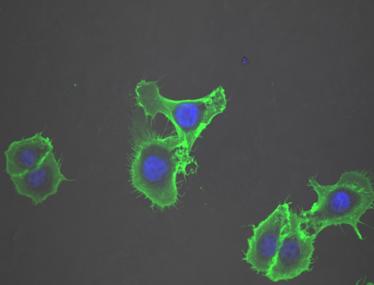Virus finds hospitable environment in the cells that line the vagina

Credit: James Mungin Jr., Meharry Medical College
Bethesda, MD – Zika virus is capable of replicating and spreading infectious particles within the outermost cells lining the vaginal tract, according to new research. The findings provide the first molecular-level insights into how the virus can move from person to person through sexual contact.
While Zika is primarily spread by mosquitoes, researchers have been aware of its potential for sexual transmission based on cases in which people became infected after having sex with a partner who had visited a Zika-affected area. Previous studies have also found Zika particles present in semen and vaginal fluid from infected individuals.
Having a more detailed understanding of how Zika infiltrates the body through sexual contact could help scientists identify new ways to prevent or treat Zika infections. The new study examined how Zika particles behaved in cultures of human vaginal epithelial cells and identified the virus’s likely entry point as a protein on the surface of the cells called tyrosine-protein kinase receptor UFO, which is encoded by the AXL gene.
“The outcome of this research highlights how local replication of Zika in the vaginal epithelium plays an important role in mediating sexual transmission and subsequent systemic infection in the human host,” said lead study author James Mungin Jr., a doctoral candidate at Meharry Medical College. “Additionally, our research findings confirming that the receptor UFO (AXL) promotes viral entry can be very instrumental in developing drugs and antibody-based therapies that target and block this receptor, therefore eliminating the pathology caused by this virus.”
Mungin was scheduled to present the research at the American Society for Investigative Pathology annual meeting in San Diego this month. Though the meeting, to be held in conjunction with the 2020 Experimental Biology conference, was canceled in response to the COVID-19 outbreak, the research team’s abstract was published in this month’s issue of The FASEB Journal.
Zika spread rapidly around the world during a major 2015-2016 outbreak, causing about 42,000 infections in the United States and its territories. While the number of cases has since dropped precipitously, the virus is still considered a health threat in many places around the world. Babies born to mothers infected with Zika have a high risk of birth defects.
Mungin and colleagues found that Zika virus particles were able to successfully enter vaginal epithelial cells through the UFO receptor, replicate their RNA genome and steadily release infectious viral particles inside the cells. The research team plans to further study the factors that contribute to Zika replication for insights on how those factors might be interrupted.
Like Zika, many other viruses in the flavivirus family are spread by insects. However, research on those other viruses, such as dengue and yellow fever, does not always translate well to Zika because they are not sexually transmitted.
“Interestingly, sexual transmission among flaviviruses is in fact unique in nature,” said Mungin. “As of now, Hepatitis C and Zika virus have been identified as the [only] two flaviviruses known to establish infection via sexual contact with an infected partner.”
According to the U.S. Centers for Disease Control and Prevention, using condoms can prevent sexual transmission of Zika.
###
Contact the media team for more information.
Image available.
About Experimental Biology 2020
Experimental Biology is an annual meeting that attracts more than 12,000 scientists and exhibitors from five host societies and more than two dozen guest societies. With a mission to share the newest scientific concepts and research findings shaping clinical advances, the meeting offers an unparalleled opportunity for exchange among scientists from across the U.S. and the world who represent dozens of scientific areas, from laboratory to translational to clinical research. http://www.
About the American Society for Investigative Pathology (ASIP)
ASIP is a society of biomedical scientists who investigate mechanisms of disease. Investigative pathology is an integrative discipline that links the presentation of disease in the whole organism to its fundamental cellular and molecular mechanisms. ASIP advocates for the practice of investigative pathology and fosters the professional career development and education of its members. http://www.
About The FASEB Journal
Receive monthly highlights from The FASEB Journal by e-mail. Sign up at http://www.
Find more press materials at: https:/
Media Contact
Anne Frances Johnson
[email protected]




